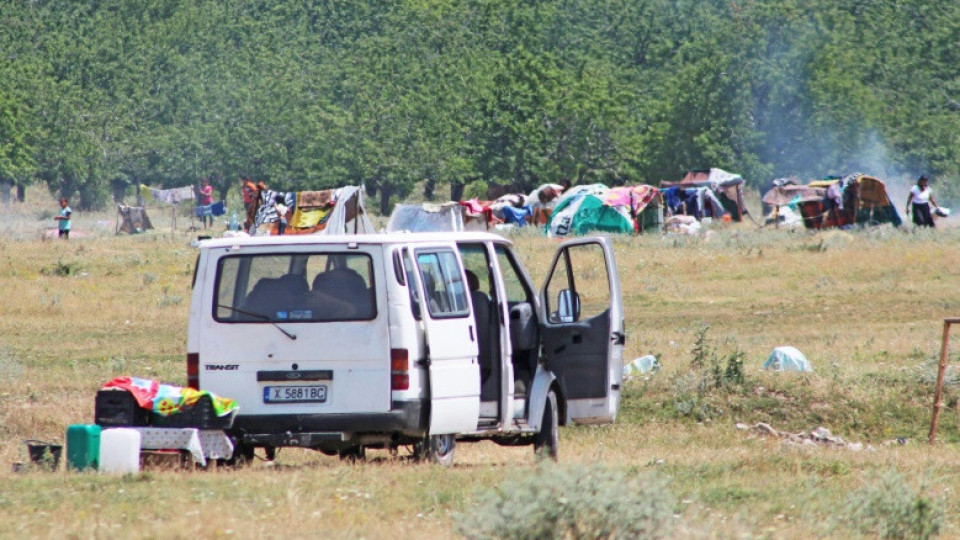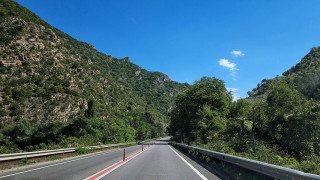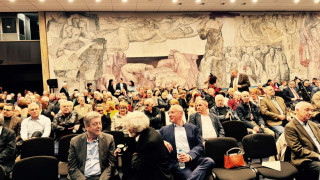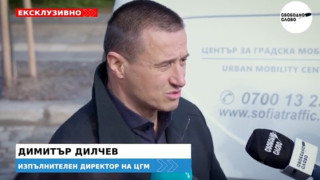The supposedly firm decision of the government to enforce rules for camping is delayed by another year. You cannot enforce bans on something you cannot define; you cannot provide rules on how it should operate, nor can you obligate someone to follow such rules.
By Stefan Dzhendov The attempts of landowners to explain that there are no legal or ethical grounds for anyone to settle on their property as they please proved futile. The total inability of the relevant institutions to create adequate statutes on the work mechanisms of camping areas where the so-called wild camping is practiced gave free passes to all trespassers until 2021: another summer without rules, requirements and responsibility, without attempts to protect the coast from the abuse of random people who decide for themselves what freedom means and guarantee loads of trash, untold quantities of booze and plenty of narcotics. One of the most ridiculous arguments of the protesters is that any attempt to enforce rules on wild camping in the country would limit the constitutional right of free movement. It is surprising how many lawyers are totally ignorant with regard to the differences between movement and arbitrary settling and occupying a territory of one’s choice. The roads on which every person in Bulgaria can move are marked with signs and they can be used even if they are not paved. No one is trying to stop the free movement of Bulgarian citizens. But this does not mean that people can sleep freely wherever they please. Let us imagine for a moment that on the basis of this right guaranteed by the Constitution a group of two dozen Roma with their children, wives, handmade tents and carts and horses instead of cars arrives at a randomly set camp. Then we will have a colorful mix of two ethnic groups, Bulgarians and Roma, with jeeps and jalopies and in the middle of it all, their four-legged friends. After all, the Constitution guarantees equal rights, doesn’t it?! [caption id="attachment_443927" align="aligncenter" width="465"] This is a Roma campground, otherwise called a Khatun. On the outside, however, there are no obvious differences.[/caption] Shall we guess what will happen? Under this scenario the media will first announce that Roma are attacking nature lovers, creating a mess, littering and their horses are soiling the beach. What filth can the people of the dark ethnic group bring? Will they go to the toilet in holes in the ground? Well, the white lovers of the wilderness are doing the same. [caption id="attachment_443928" align="aligncenter" width="456"]
This is a Roma campground, otherwise called a Khatun. On the outside, however, there are no obvious differences.[/caption] Shall we guess what will happen? Under this scenario the media will first announce that Roma are attacking nature lovers, creating a mess, littering and their horses are soiling the beach. What filth can the people of the dark ethnic group bring? Will they go to the toilet in holes in the ground? Well, the white lovers of the wilderness are doing the same. [caption id="attachment_443928" align="aligncenter" width="456"] This is an example of camping in an arbitrary area in the forest[/caption] The Roma will drink alcohol, they will eat, litter and listen to their favorite music loud? Of course! The other residents of the populated “wild” area do the same. In front of the media the topic can be reduced to the question whether the campers from other ethnic groups bring big black thrash bags or whether horses are worse for the beach than big dogs let loose to run freely in all directions. Apart from that everything else is the same. Following this logic any migrant from Iran, Iraq or an African country can be a camper and go wild. It turns out that the territory for wild camping is reserved for a circle of people who think that they have more rights than anybody who would question their rights. [caption id="attachment_443929" align="aligncenter" width="460"]
This is an example of camping in an arbitrary area in the forest[/caption] The Roma will drink alcohol, they will eat, litter and listen to their favorite music loud? Of course! The other residents of the populated “wild” area do the same. In front of the media the topic can be reduced to the question whether the campers from other ethnic groups bring big black thrash bags or whether horses are worse for the beach than big dogs let loose to run freely in all directions. Apart from that everything else is the same. Following this logic any migrant from Iran, Iraq or an African country can be a camper and go wild. It turns out that the territory for wild camping is reserved for a circle of people who think that they have more rights than anybody who would question their rights. [caption id="attachment_443929" align="aligncenter" width="460"] The illegal campsite in Tsarevo popped up and started to expand.[/caption] In fact, ploughing into a beach area with a private vehicle for as far as your tires can turn is not “freedom of movement”; it is misconduct pending sanction if, of course, rules are drafted to impose fines and some brave souls are found to enforce these rules. The battle between the supporters and opposers of the legalization and canalization of the love for the wilderness and uncontrolled camping is led on several different planes: The first lines include “the barkers”. They have heard the words Constitution and freedom, so they shout these words from the top of their lungs simply because their task is to do so. The barkers themselves want no more than to be in the vanguard of those who enjoy the freedom to drink, roll in the sand and take drugs without being held accountable. When emotions are expressed in urban conditions, they lift children on their shoulders who wave tents with conservation appeals. No one underestimates the pioneer enthusiasm of the campers who teach their kids from early age to graze ecologically and to go to the toilet wherever they please. It is a fact that the cast division within the ranks of the freedom lovers leads to conflicts among themselves. But they have a common enemy in the face of the state that is too feeble to enforce clear rules about the responsibilities of the campers. It is the chaos and indecisiveness in the preparation of the legislative documents that give courage to green leaders to invent non-existing risks and threats for people with tents and camper vans. The forester Toma Belev who, together with his wife, controls green organizations with the main aim to halt the development of modern mountain infrastructure, to appropriate millions for the protection of geese and beetles and to simulate activity at places where such is not needed, commented again on the amendments in the Law of land planning of the Black Sea coast and painted a dark picture: “People with camper vans, caravans, tents or pavilions risk to be fined unless they are on their own property or at a bivouac. The implementation of this legal hotchpotch will lead to fining:
The illegal campsite in Tsarevo popped up and started to expand.[/caption] In fact, ploughing into a beach area with a private vehicle for as far as your tires can turn is not “freedom of movement”; it is misconduct pending sanction if, of course, rules are drafted to impose fines and some brave souls are found to enforce these rules. The battle between the supporters and opposers of the legalization and canalization of the love for the wilderness and uncontrolled camping is led on several different planes: The first lines include “the barkers”. They have heard the words Constitution and freedom, so they shout these words from the top of their lungs simply because their task is to do so. The barkers themselves want no more than to be in the vanguard of those who enjoy the freedom to drink, roll in the sand and take drugs without being held accountable. When emotions are expressed in urban conditions, they lift children on their shoulders who wave tents with conservation appeals. No one underestimates the pioneer enthusiasm of the campers who teach their kids from early age to graze ecologically and to go to the toilet wherever they please. It is a fact that the cast division within the ranks of the freedom lovers leads to conflicts among themselves. But they have a common enemy in the face of the state that is too feeble to enforce clear rules about the responsibilities of the campers. It is the chaos and indecisiveness in the preparation of the legislative documents that give courage to green leaders to invent non-existing risks and threats for people with tents and camper vans. The forester Toma Belev who, together with his wife, controls green organizations with the main aim to halt the development of modern mountain infrastructure, to appropriate millions for the protection of geese and beetles and to simulate activity at places where such is not needed, commented again on the amendments in the Law of land planning of the Black Sea coast and painted a dark picture: “People with camper vans, caravans, tents or pavilions risk to be fined unless they are on their own property or at a bivouac. The implementation of this legal hotchpotch will lead to fining:
- All campers with tents, motor homes and camper vans in the legal and licensed tourist campsites, because the campsites are not and cannot become bivouacs.
- The owners of licensed campsites;
- Every owner of a motor home or a camper van parked along the road or at a parking lot in the two-kilometer area around the Black Sea, outside the borders of settlements (these are the borders defined as of January 1, 2009, as laid down in the law for Zone B);
- Beach concession holders or renters of establishments outside settlements, if they decide to place a tent for their clients because the tent will be on someone else’s property.
- Owners of summer houses or houses in Zone B, if they decide to invite friends over with their camper van. In order to invite such a guest, your property must not have buildings on it and must be registered as a bivouac.
- The organizers of various sport and cultural events outside of settlements, if they allow themselves the liberty of placing tents for temporary protection of the participants.
- The owners of establishments, parking lots or gas stations outside of settlements, if they allow a camper van or a motor home on their area...”
This sounds apocalyptic and leads to the conclusion that anyone who dares to go on a holiday with a tent or a camper van will be physically destroyed. What part of the statement is nonsense?
- First, fines will be imposed only on people who settle with tents, shelters made of sticks and rugs or camper vans on the private property of a physical person who has nothing to do with tourism.
- Second, the term “licensed campsite” does not exist in Bulgarian legislation. The correct term is “a campsite placed in service”. This is a regulated property and no fines are imposed on its area. So, landowners who decide to turn their properties into campsites cannot be fined.
- Each beach concessionaire can place movable objects on 2% of the territory of the coastline. Therefore, it is not a problem to erect one, two or five pavilion tents where people can rest in the shade while enjoying the beach.
- The owners of unregulated property who decide to fill their land with tents or camper vans of friends, possibly to benefit from this service in secret, will also not be fined for the occupation of the territory. Combatting the grey sector is a responsibility of other institutions and laws.
- People who arbitrarily settle where they please and stay with days will be fined.
These measures are no different than the rules adopted in countries where camping is part of the popular culture. The rules and the sanctions are clearly stated and strictly applied. It is not a coincidence that in Croatia, where the main tourism is connected to the sea, the second most expensive experience after yacht tourism is camping. The campsites there are classified by type of accommodation and by stars according to the conditions they offer. Any attempt to pitch a tent under the stars or stop with a camper van in the pleasant shade along the road and stay there for some time will be sanctioned with a fine of several hundred to several thousand euros. In Bulgaria the people who protest against the amendments in the Law of land planning of the Black Sea coast oppose the enforcement of rules, because such changes would provide the opportunity to establish where and under what conditions the camping lovers will be able to take advantage of the law and settle comfortably, without any risk of being chased, attacked and humiliated. The foreseen fines are not a form of restriction, but rather a way to sanction free-riders and protect the rights of those who want to spend their vacation away from people who have decided that the place is nice and they can do as they please. [caption id="attachment_443930" align="aligncenter" width="471"] Camper vans are placed arbitrarily: on this beach and on this sand.[/caption] The common thing between these trespassers and the aggressors on the beaches who settle wherever they please with cars and motor homes is the guaranteed perception of impunity. One more detail eludes the public attention focused on the hysteria with sands, dunes and trespassing into private property: camping and the freedom to relax in nature are not limited to the seaside and the beaches. Bulgaria is a mountainous country and the people who prefer the shady forests and the refreshing coolness of heights are actually more than the ones who loudly and demonstratively pick a place on the sand, a meter away from the water, if possible. There is not a single national survey on how Bulgarians like to spend their vacation. While tourist organizations grab any opportunity to publicly advertise their businesses – spa or conferences – or count how many cars cross the border with our southern neighbors, there is not a single institution that can state how many campsites are needed for the Bulgarians, how many people would go camping every weekend and how many would spend their vacation at a campsite. Not only that, but neither the Ministry of Tourism, nor the Ministry of Ecology, no one can actually say how the tourist profile changes. How many guests from abroad would like to camp in Bulgaria? Where and for how long? What type of infrastructure is needed at the campsites? This is an uncharted territory and the emotional answers of the campers’ representatives to such questions are a bit of a stretch. They think that the number is this or the other, basically reporting random numbers. Toma Belev deliberately avoids talking about the mountains in summer. On Vitosha, amongst protected areas, SUVs enter directly through the vegetation, right next to tourists going for a walk. There is no power, no institution, no sanction that can stop them.
Camper vans are placed arbitrarily: on this beach and on this sand.[/caption] The common thing between these trespassers and the aggressors on the beaches who settle wherever they please with cars and motor homes is the guaranteed perception of impunity. One more detail eludes the public attention focused on the hysteria with sands, dunes and trespassing into private property: camping and the freedom to relax in nature are not limited to the seaside and the beaches. Bulgaria is a mountainous country and the people who prefer the shady forests and the refreshing coolness of heights are actually more than the ones who loudly and demonstratively pick a place on the sand, a meter away from the water, if possible. There is not a single national survey on how Bulgarians like to spend their vacation. While tourist organizations grab any opportunity to publicly advertise their businesses – spa or conferences – or count how many cars cross the border with our southern neighbors, there is not a single institution that can state how many campsites are needed for the Bulgarians, how many people would go camping every weekend and how many would spend their vacation at a campsite. Not only that, but neither the Ministry of Tourism, nor the Ministry of Ecology, no one can actually say how the tourist profile changes. How many guests from abroad would like to camp in Bulgaria? Where and for how long? What type of infrastructure is needed at the campsites? This is an uncharted territory and the emotional answers of the campers’ representatives to such questions are a bit of a stretch. They think that the number is this or the other, basically reporting random numbers. Toma Belev deliberately avoids talking about the mountains in summer. On Vitosha, amongst protected areas, SUVs enter directly through the vegetation, right next to tourists going for a walk. There is no power, no institution, no sanction that can stop them.  Every single day between 2500 and 4000 vehicles enter Pirin. The drivers park wherever they like – under a thick shade, if possible. The pollution generated by these cars is more harmful than logging. The noise and the discarded wastes kill forest species, different insects, and chase away wild animals. On this background, the management of Bansko skiing area has adopted the most ecological and environmentally-friendly practices connected with zero use of harmful materials such as plastics, stirrers, straws and other disposable articles that cannot be recycled. In summer the people who seek proper recreation know that Bansko offers great entertainment and opportunities for relaxation. The cable car (this monstrous creation is the most environmentally friendly form of mountain transport in the world!) works until 6:30 pm. Bansko is the only destination in the world that has a 400-meter slide placed on a ski slope. The slide is the longest in Europe and the second longest in the world, after a competitor from the USA.
Every single day between 2500 and 4000 vehicles enter Pirin. The drivers park wherever they like – under a thick shade, if possible. The pollution generated by these cars is more harmful than logging. The noise and the discarded wastes kill forest species, different insects, and chase away wild animals. On this background, the management of Bansko skiing area has adopted the most ecological and environmentally-friendly practices connected with zero use of harmful materials such as plastics, stirrers, straws and other disposable articles that cannot be recycled. In summer the people who seek proper recreation know that Bansko offers great entertainment and opportunities for relaxation. The cable car (this monstrous creation is the most environmentally friendly form of mountain transport in the world!) works until 6:30 pm. Bansko is the only destination in the world that has a 400-meter slide placed on a ski slope. The slide is the longest in Europe and the second longest in the world, after a competitor from the USA.  Banderishka lawn boasts a huge entertainment center with inflatable castles, swings, playgrounds, climbing walls and a football field. The people who spend their holidays there share that after a whole day of sports they enjoy a big dinner and go to sleep feeling well exercised.
Banderishka lawn boasts a huge entertainment center with inflatable castles, swings, playgrounds, climbing walls and a football field. The people who spend their holidays there share that after a whole day of sports they enjoy a big dinner and go to sleep feeling well exercised.  In summer Banderishka lawn is also a mountain biking base and offers special tracks for extreme descents. The ski slope in Bansko is unique because it is covered with grass. This makes it suitable for summer sports as well.
In summer Banderishka lawn is also a mountain biking base and offers special tracks for extreme descents. The ski slope in Bansko is unique because it is covered with grass. This makes it suitable for summer sports as well.  Now is it clear why conservationists never mention the winter resorts in summer? On Pamporovo the lifts also work every day. The people who love the mountain are also there. They are taking walks, having fun, using environmentally friendly infrastructure that offers endless possibilities for trips. Wild camping must be considered not only for the beaches, but also for the mountains. In countries where environmental protection is a priority, in the mountains open for camping, the parking lots are usually 3 – 4 km away from the border of the forest belt. The areas where tents can be placed are designated. The park management checks the equipment of the tourists and specifically enquires about the way they intend to cook food. Starting a fire in the open, outside of the specifically designated fireplaces in the camping area, is sanctioned with huge fines. Such an offence often leads to arrest and further investigation. Let us go back to the ecologists in Bulgaria. They are not concerned with mountain and forest protection, as long as the people committing crimes there claim their right to do so. The ecologists do not mind people entering the forests with their vehicles, erecting mini villages, destroying vegetation and starting fires. It turns out that in our country the topic is reduced to ecology of interests. In summer the direct interest is to protect the lawlessness at the seaside, while the mountains are not that attractive. The attempts of Bulgarian campers to threaten that if wild camping is banned, they will go to Greece failed after several groups with tents pitched on random beaches were arrested in our southern neighbor for taking such liberty and big fines were imposed. And so, our people realized that in Europe savagery is tolerated and blessed only in Bulgaria. One question remains: What is the direct interest of Bulgarian ecologists in protecting the uncontrolled use of state territories without any payment and not holding people liable for their acts? Why it is indeed the ecologists that think that lodging on private land is a constitutional right? Bulgarians have always believed that a short free ride is better than no ride at all and, following this principle, the summer of 2019 may be the last season when lawlessness is offered in the shape of a governmental gift. Lentata.com
Now is it clear why conservationists never mention the winter resorts in summer? On Pamporovo the lifts also work every day. The people who love the mountain are also there. They are taking walks, having fun, using environmentally friendly infrastructure that offers endless possibilities for trips. Wild camping must be considered not only for the beaches, but also for the mountains. In countries where environmental protection is a priority, in the mountains open for camping, the parking lots are usually 3 – 4 km away from the border of the forest belt. The areas where tents can be placed are designated. The park management checks the equipment of the tourists and specifically enquires about the way they intend to cook food. Starting a fire in the open, outside of the specifically designated fireplaces in the camping area, is sanctioned with huge fines. Such an offence often leads to arrest and further investigation. Let us go back to the ecologists in Bulgaria. They are not concerned with mountain and forest protection, as long as the people committing crimes there claim their right to do so. The ecologists do not mind people entering the forests with their vehicles, erecting mini villages, destroying vegetation and starting fires. It turns out that in our country the topic is reduced to ecology of interests. In summer the direct interest is to protect the lawlessness at the seaside, while the mountains are not that attractive. The attempts of Bulgarian campers to threaten that if wild camping is banned, they will go to Greece failed after several groups with tents pitched on random beaches were arrested in our southern neighbor for taking such liberty and big fines were imposed. And so, our people realized that in Europe savagery is tolerated and blessed only in Bulgaria. One question remains: What is the direct interest of Bulgarian ecologists in protecting the uncontrolled use of state territories without any payment and not holding people liable for their acts? Why it is indeed the ecologists that think that lodging on private land is a constitutional right? Bulgarians have always believed that a short free ride is better than no ride at all and, following this principle, the summer of 2019 may be the last season when lawlessness is offered in the shape of a governmental gift. Lentata.com








Коментирай